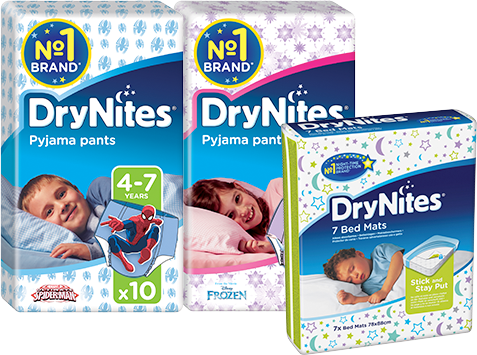Bedwetting Advice
Although accidents at night are not uncommon at this age, handling the situation with the right attitude will help to limit the impact of these accidents until your child develops night time dryness:
Be sensitive
As your child becomes more aware of what’s going on, they might start to feel anxious and concerned. Accidents at night are also bound to cause upset. While the situation might be frustrating for you, it’s important to show your child that you understand what they are going through. This will help reassure them that their feelings are normal.
Help them understand
At this age, children are unlikely to understand why they are wetting the bed, so explain what’s going on. Be clear that it isn’t their fault and reassure them that they will achieve night time dryness in their own time.
Provide encouragement
As with potty training, encouragement and motivation are key factors in getting through bedwetting. Praise helps build a child’s confidence, so celebrating small “steps along the way” - such as going to the toilet before bedtime without prompting - will help to keep them focussed and counteract the disappointment of when things don’t go so well. Ensuring they understand that bedwetting is beyond their control and that no one is to blame is also crucial.
Get expert support
The more information you have, the more you understand why bedwetting happens and what you can do to help manage the situation. The DryNites® website is full of articles, guides and advice from medical experts that can support you through this stage. However, it’s always best to talk to your doctor or health visitor about specific concerns you and your child might have about bedwetting.
Use DryNites to help manage bedwetting
DryNites® Pyjama Pants provide effective protection against night time accidents and keep the sheets dry, and are designed to look and feel like regular underwear. They help your child get a good night’s sleep, keep their confidence high, and save you a lot of effort at night.


